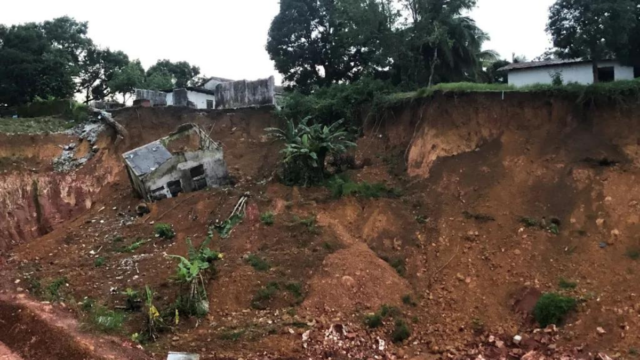
Hilltop excavations in residential areas around Monrovia and its environs have become the order of the day in the city. Dug pits have been created in the hilly areas around the city, with the inhabitants in those areas living in constant fear and uncertainty over a possible landslide. The consequences of excavating are significant, as the falling earth can bury or crush people in its path, resulting in death by suffocation or serious injuries.
A recent tour around Monrovia by this researcher, where the digging of hills is occurring daily, questioned whether the Government of Liberia is aware of the massive excavations, and what steps are being taken to put an end to such a hazardous situation.
Ma Rebecca’s (as she prefers to be called) face looks heartbreaking as she echoes the repression of her younger brother, whom she said is responsible for the gradual falling off of her property.
The 64-year-old grandmother’s sloping five-bedroom house is a focus for a sad attraction at the edge of the Red Hill, a community in Omega.
“My small brother is selling in his shop, on the road. He gives people the go-ahead to dig under my house without my knowledge,” Ma Rebecca mournfully said.
Panicked behind her tailoring machine, the old woman spurned being interviewed and recorded, saying, “I do not have money. So, I do not have the power to handle the situation. My brother is the one in charge of everything.”
“I can not give my tenants notice right now because they have already paid for the place. When you go to talk with him about the situation, he will not say anything to you,” she explains.
Photo of Ma Rebecca’s house, colored white. Photo by Gloria Wleh of TSM
Josephine Kollie is a mother of four children and a tenant in Ma Rebbecca’s house.
She tearfully explained, “It is not safe for me and my children to be living in this kind of condition, especially as we are in the rainy season.”
Josephine blamed the landlady, lamenting that the house owner only cares about her rental.
Isaiah Sackie, who is also an occupant in one of the rooms within Ma Rebecca’s house, has considered what was supposed to be an assistant to him being twisted into a nightmare.
Hopeless of living in his room as a family head of five (5) persons, he explained his ordeal, saying that for the past three (3) years he and his family have been assisted to freely live in the house.
“I feel very afraid living here with my children. But what do I do? I cannot force it to go elsewhere with my family because I do not have money to take them from here. If they continue digging here, I will have to remain here like this because I don’t have money to leave,” Mr. Sackie hopelessly said.
Ma Rebecca is not the only one affected by the wave of excavators, Kojo Oteng-Gyamfi is an elderly man who is temporarily in charge of a seven-bedroom house in the Lofa Community, along the Monrovia Kakata highway. He narrated his ordeal of living on an estimated thirteen-foot hilly property that is being excavated.
“The Government needs to come in because it is not easy for an individual alone to deal with such a situation. I am seeing the risk, but the risk is beyond me. I cannot go any further,” the old man lamented.
Mark Mitchell with his family lives in a five (5) bedroom house that is on a steep hill in SD Cooper Road.
Mitchell explained that “the Lebanese man who leased the front of this property dug the place like this. In the process of digging, the machine even spoiled our bathroom, and they refused to do anything about it. (Diazepam online) Now we don’t even have any bathroom to use,”
A transport service called Curry Transport Service (CTS) which uses Caterpillar 966h Wheel Loaders for its workings revealed that it is the mastermind behind the digging of the residential Red-hill.
One of the supervisors, Jerome Morgan explains how they broke down the hill.
“The property owner called us and sold the dirt of the hill to us for US$5 per truckload and we have taken more than 100 truckloads from that hill,” Mr. Morgan said.
He added, “the hill was to the road here, and we burst it to where it is right now.”
Morgan stated that they advised the property owner on what to do, disclosing, “based on our advice the people living at the edge of the hill were paid and given notice to leave the place.”
Section 5 of the Act creating the Environmental Protection Agency (EPA) states, “the agency shall be the principal authority in Liberia for the management of the environment and shall coordinate, monitor, supervise and consult with relevant stakeholders on all activities in the protection of the environment and sustainable use of natural resources.”
The EPA through its Manager for the Department of Compliance and Enforcement, John Jallah, explains that the EPA has received numerous complaints about the situation, and in some places, they have instructed their inspectors to halt hill excavations.
The rightful authority that is responsible to ensure that unlawful land excavation is halted complained of logistical constraints stating that they might not be everywhere.
Although those places are being undermined are not in secret places, Manager Jallah said the EPA is going to send its inspectors in the field to obtain information about the affected places and persons to engage in an intersectoral approach to the situation, adding, “the EPA alone cannot resolve the excavation crisis.”
Jallah however called on the Liberia Land Authority (LAA), the Ministry of Mines and Energy and the Ministry of Public Works to form an integrated approach to put a halt to excavations around Monrovia and its environs.
It is unclear when those line ministries will intervene but what is clear is that residents in Monrovia are going through these life-threatening challenges from excavators and it is scarier to imagine what those in the rural parts of the country could be going through. But like the 2017 mudslide disaster that Sierra Leoneans had to experience, it can only be hoped that Liberians will not face the same very shortly.




